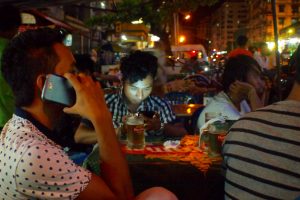A donor-funded election app designed to provide information to Myanmar voters has come under fire for its potential to inflame racism and religious nationalism ahead of elections on November 8.
The mVoter 2020 app, which was launched on September 29, was developed by the Stockholm-based organization International Democracy and Electoral Assistance (IDEA), under the EU-funded STEP Democracy program. The app was built in partnership with The Asia Foundation and Myanmar’s Union Election Commission (UEC).
The app, based on a similar application produced ahead of the last election in 2015, provides data on around 7,000 candidates running in Myanmar’s 2020 election. But according to Justice for Myanmar, a Myanmar advocacy group, the biographical information prominently features the candidates’ race and religion, including those of their mother and father.
In particular, the group argues that the mVoter 2020 app described one Muslim Rohingya candidate as “Bengali,” a term that is employed by the Myanmar government to refer to the beleaguered Muslim Rohingya minority. The word implies that Rohingya are illegal immigrants and do not belong in Myanmar.
In August 2017, Myanmar’s army responded to scattered attacks by Rohingya militants by torching villages, shooting civilians, and driving more than 700,000 desperate people over the border into Bangladesh. The United Nations’ human rights chief later described the military’s actions as “acts of appalling barbarity” and possible “acts of genocide.”
Justice for Myanmar highlights the app’s entry for Dus Muhammed (aka Aye Win), a candidate for the Human Rights and Democracy Party who is standing for a lower house seat in Maungdaw, in northern Rakhine State. One of the few Rohingya whose candidacy for the election has been approved, the mVoter 2020 app lists the race of he and his parents as “Bengali-Bamar.”
According to the organization, the data was presumably based on Myanmar’s rigid official taxonomy of 135 “national races,” which has “rendered Rohingya stateless and been used as a pretext to disqualify Rohingya candidates and disenfranchise Rohingya voters from the election.” The official policy of the Myanmar government is that the “Rohingya” don’t exist, that they are illegal immigrants from Bangladesh, even though many claim to have lived there for generations.
“Instead of providing access to much-needed, accurate information for voters, the mVoter 2020 app risks inflaming ethnic and religious nationalism during the election,” Justice For Myanmar spokesperson Yadanar Maung said in the statement. “The publicizing of candidate race and religion would be unacceptable to voters in donor countries, and is unacceptable in Myanmar.”
At least a dozen Rohingya applied to run as candidates in the election, but six were rejected in August after UEC officials said they failed to fulfill arcane electoral rules, including a requirement that they prove that both of their parents were citizens at the time of their birth. Even then, some claim their candidacies were rejected. At the same time, hundreds of thousands of Rohingya in Bangladesh and Rakhine State have been effectively disenfranchised and will be unable to cast a ballot.
Given the number of candidates featuring in the app, and the fact that the software uses the Burmese language, it is conceivable that the “Bengali” issue was an oversight on the part of the developers. But the broader acceptance of the Myanmar government’s racial categorizations – the conceptual framework that underlies the country’s deep ethnic and sectarian rifts – encapsulates the difficulty that foreign donor governments and international NGOs face in working in Myanmar.
Failing to accept the rigid strictures of the “135 national races,” or employing the term “Rohingya,” runs the risk of stoking the ire not just of the government, but also many of its ethnic Burman supporters. When the U.S. government employed the term Rohingya, Aung San Suu Kyi, Myanmar’s de facto leader, asked Washington not to use the term. Meanwhile, as Yuzuki Nagakoshi noted in these pages in January, Japan has shied away from using the word, wary of alienating the Myanmar government and pressing it into the arms of China. In a Burmese-language interview with BBC Burma in August 2019, Japanese Ambassador Ichiro Maruyama, even referred to the Rohingya as “Bengali.”
Given that the Myanmar military has been accused of genocide and crimes against humanity, this poses a possibly insuperable dilemma for international organizations working in the country. It also forces the urgent question of whether the benefits of engagement outweigh the costs. As long as governments and organizations answer in the affirmative, the rhetorical cartwheels look certain to continue.

































